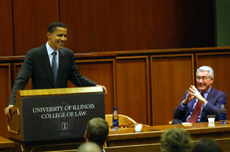Obama enthralls spirited crowd

Shira Weissman
Oct 12, 2004
Last updated on May 11, 2016 at 04:16 p.m.
Students packed the College of Law building Monday afternoon to hear U.S. Senate candidate Barack Obama speak.
State Sen. Obama (D-Chicago) spoke to an overflowing crowd in the Max L. Rowe Auditorium. The speech was part of a series of lectures organized in joint venture by the College of Law and the Institute of Government and Public Affairs (IGPA) and led by former Republican Illinois governor Jim Edgar.
“Just to give you an idea of how popular this man is,” Edgar began as he introduced Obama, “when my wife Brenda first found out that he was running for the U.S. Senate she told me, ‘Well I’m sure glad that you’re not running for the U.S. Senate.'”
Obama started off his speech on an autobiographical note, describing how he went from a “high school goof off,” to gaining an interest in social affairs and grassroots politics. He said after attending Columbia University in New York for about a year, he began to protest with the anti-apartheid movement in the early ’80s. From there, he gradually moved on to do volunteer work in neighboring New York communities such as Harlem and the Bronx.
Get The Daily Illini in your inbox!
He said he moved to Illinois when he was offered an administrative job on the south side of Chicago by a group of churches that were working to curb the unemployment problems in the community.
“Working in Chicago was the biggest learning experience of my life,” he said. “It made me see that extraordinary things can happen from the efforts of ordinary people.”
Obama went on to describe how his experience in Chicago catalyzed his interest in politics and also echoed many sentiments from his keynote address at the Democratic National Convention to further describe why he remains so passionate about politics.
“I chose politics because I believe in the idea that we are all connected together as people of one community,” he said. “If a senior citizen right here in Champaign County or halfway across the state has to choose between paying for groceries or paying for medication, that is of great concern to me as well.”
Edgar said the speech was not intended to be a campaign rally for Obama, who offered some unbiased criticism of the present-day state of politics.
“When they’re not being bombarded by messages from Michael Moore or Fox News, citizens today have to deal with politicians who habitually lie, blatantly mischaracterize their opponents and do other things that would not be accepted at all in any other aspect of society,” Obama said. “We, as politicians, need to learn how to disagree without being disagreeable. People want politicians who attack the issues, not each other.”
Obama also said he is bothered by what he described as the “either/or mentality” of politics today. He said that people, in general, should stop isolating themselves to just one ideological side of any given problem and start to recognize it as a “both ends problem.” His rhetoric was purposefully aimed at regular people because, he said, the most important office in any democracy is that of the citizen.
After his address, Obama further elaborated on the importance of citizen participation by focusing on why college students in particular should get involved in politics.
“College students have to recognize that they have the biggest stakes to gain or lose based on the decisions that their leaders make,” he said.
Akinyele Oluwole, freshman in LAS, said the Obama appearance was a highlight to his day.
“I was extremely satisfied with the fact that he took time out, so close to the election, to come down here and speak to all the students as energetically as he did,” Oluwole said.
As a Republican, Edgar said the purpose of the event was more than a show of support for either political party.
“I don’t worry about what party someone is in, I just invite those who can not only cater to the students’ interests, as the Senator certainly did, but their education as well.”





